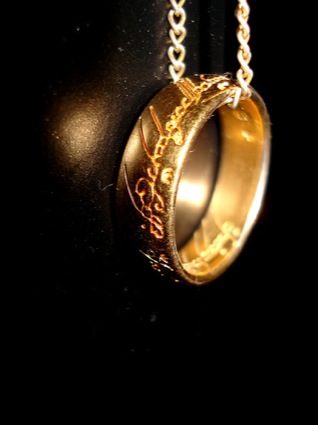Back to Iron John for a bit here. Bly is onto something here. He rambles for a while and provides (along with plenty of other folks) some misdiagnosis. Nevertheless, I really think that for men and boys, what he’s talking about here should NOT be brushed off.
Now back to the story. [The Brother’s Grimm fairy tale of Iron John.]
One day the King’s eight-year old son is playing in the courtyard with the golden ball he loves, and it rolls into the Wild Man’s cage. If the young boy wants the ball back, he’s going to have to approach the Hairy Man and ask him for it. But this going to be a problem.
The golden ball reminds us of that unity of personality we had as children-a kind of radiance, or wholeness, before we split into male and female, rich and poor, bad and good. The ball is golden, as the sun is, and round. Like the sun, it gives off a radiant energy from inside.
We notice that the boy is eight. All of us, whether boys or girls, lose something around the age of eight. If we still have the golden ball in kindergarten, we lose it in grade school. Whatever is still left we lose in high school. In “The From Prince,” the princess’s ball fell into a well. Whether we are male or female, once the golden ball is gone, we spend the rest of our lives trying to get it back.
The first stage in retrieving the ball, I think, is to accept-firmly, definitely-that the ball has been lost. Freud said: “What a distressing contrast there is between the radiant intelligence of the child and the feeble mentality of the average adult.”
So where is the golden ball? Speaking metaphorically, we could say that the sixties culture told men they would find their golden ball in sensitivity, receptivity, cooperation, and nonagressiveness. But many men gave up all aggressiveness and still did not find the golden ball.
The Iron John story says that a man can’t expect to find the golden ball in the feminine realm, because that’s not where the ball is. A bridegroom secretly asks his wife to give him back the golden ball. I think she’d give it to him if she could, because most women in my experience do not try to block men’s growth. But she can’t give it to him, because she doesn’t have it. What’s more, she’s lost her own golden ball and can’t find that either.
Oversimplifying, we could say that the Fifties male always wants a woman to return his golden ball. The sixties and Seventies man, with equal lack of success, asks his interior feminine to return it.
-Robert Bly, Iron John, p.7
And a bit later:
Most men want some nice person to bring the ball back, but the story hints that we won’t find the golden ball in the force field of an Asian guru or even the force field of gentle Jesus. Our story is not anti-Christian but pre-Christian by a thousand years or so, and its message is still true-getting the golden ball back is incompatible with certain kinds of conventioal tameness and niceness.
The kind of wildness, or un-niceness, implied by the Wild Man image is not the same as macho energy, which men already know enough about. Wild Man energy, by contrast, leads to forceful action undertake, not with cruelty, but with resolve.
The Wild Man is not opposed to civilization; but he’s not completely contained by it either. The ethical superstructure of popular Christianity does not support the Wild Man, though there is some suggestion that Christ himself did.
So what is this? Just more of the usual psychology we hear? The man trying to find himself. The longing for significance. Broken as a child. Etc. Well, sure, I think you can analyze and boil it down to some of these things, but in doing so you soften the edges and get further away describing the real issue. The myth, the fairy tale here (discussed in more depth throughout the book) is actually more potent.
Bly is not a Christian and (as we discover later in on) he clearly doesn’t know much about it either. But he knows what he’s seen in America in the last 50 years. I don’t think you can blame him for being turned off by a one-dimensional “gentle Jesus”. We should be more turned off by that image too. Another thing I appreciate is that he repeatedly reminds us that being a “macho man” has almost nothing to do with the quest he’s talking about. The author of Wild at Heart (though he does give that qualification too) probably should have mentioned it about 100 more times than he does.
Bly must be in a funny place. He’s a contemporary liberal intellectual. The book was written in the late eighties and he frequently uses anecdotes to take pot shots at Ronald Reagan. BUT, he’s not dumb. He looks at the feminism of the 60’s and 70’s and says, “Yah know, there are some serious problems with this stuff. Especially for guys”. It’s not a PC message amongst his colleagues, so he can’t go more than a few paragraphs without softening it up so as not to offend his progressive friends.
He repeatedly notes that the idea he’s wrestling with in the book is hard to grasp. I think he’s completely right. There is still room for someone to do a more helpful job explaining this without veering off into the ditches on either side of the road.

